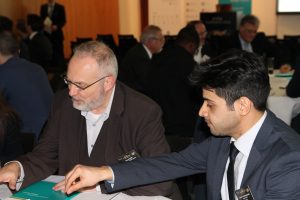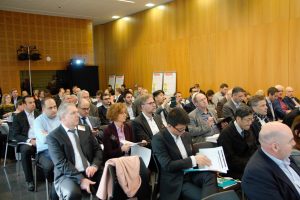In the frame of the FTTH Conference 2018 in Valencia, the CORA concept was presented and discussed with over 100 broadband stakeholders at the Governmental Day Workshop on 13. February 2018. The workshop provided a great platform for know-how exchange with the focus on Rural Digital Divide as one of the main digitalization concerns in Europe.
Featured by a keynote from Carlota Reyners Fontana (Head of Unit B5, DG Connect) European Commission Policy Update, broadband development initiatives and actions within the European Commission, such as the BCO network, funding and financing possibilities, connectivity for a European Gigabit Society, WiFi4EU and Broadband Europe were presented to the audiences. This was followed by short presentations of the winners and finalists of the European Broadband Awards 2017.
Furthermore, CORA transnational approach was presented by Peyman Khodabakhsh (CORA project manager, aconium GmbH) opening up a Multilouge session (round table discussions) with the focus on “tackling the rural digital divide”. In this context, CORA partners had the chance to discuss and exchange their views and ideas with the participants of the workshop. The participants discussed the challenges and formulated recommendations for tackling the rural digital divide in the fields of policy, regulation, finance, technology and take-up.
The identified main challenges for bridging the digital divide in rural areas include infrastructural as well as socio-economic issues:
- Cultural differences between inhabitants of urban and rural areas and as a result different expectations and needs,
- Limited effectiveness of the funding and financing measures i.e. ease of cash-flow when deploying infrastructural projects,
- Lower take-up rates and, as a result, higher investment risks for private investors,
- Physical and geographical barriers (e.g. longer distances) in rural areas and the higher investment and deployment costs thereof,
- Lower rates of access and use of digital technologies in rural areas, due to the limited digital skills of different social groups i.e. elderly,
- Convergence of technologies and emerge of wireless solutions such as 5G.
The following recommended actions may help when dealing with the challenges:
- Lighthouse and piloting i.e. concentration on tourism spots, public places and local busi-nesses in rural areas, to demonstrate to the inhabitants the advantages of the digitalisation,
- Understanding local needs and taking the regional perspective and context,
- Caution and flexibility in regulatory measures and incentives on EU and national level to give space to the Member States, regions and local communities for taking stronger role,
- Expanding the role of utility providers by introducing and providing the new broadband products and services,
- Closer cooperation with the existing utility providers with the aim of enhancing syner-gies and minimizing the deployment costs,
- Leadership, political and community commitment. Getting local authorities on board as front-runners,
- Promote tax deductions and incentives for broadband rollout or broadband products,
- Take rather long-term perspective instead of short-term thinking i.e. investing in future proof technologies,
- Creative solutions with new business models. Communicating the innovative solutions and ideas to financial institutions and investors,
- Introduce or expand training on digital skills and life-long learning. No one shall be left behind!
- Capacity building and communicating the importance of internet and the digital world.



